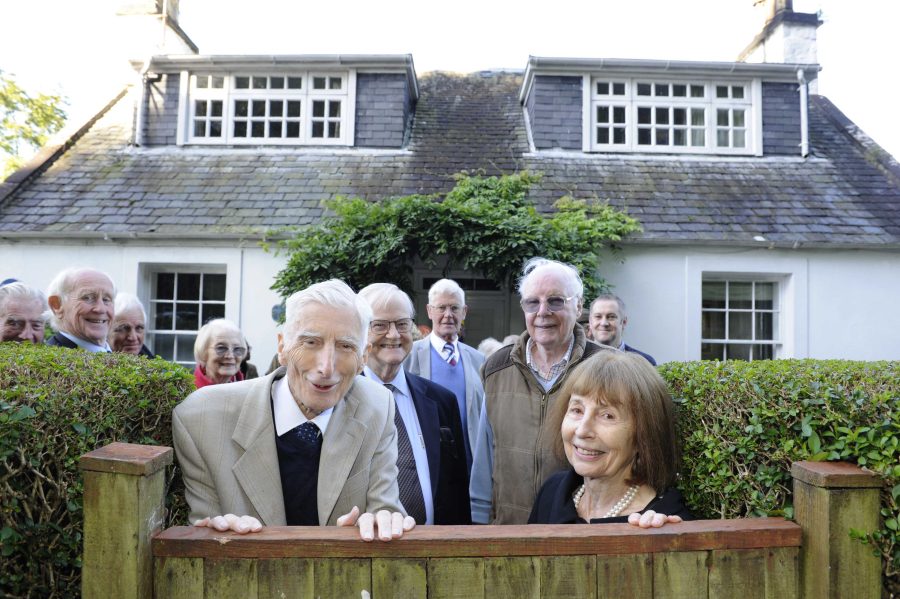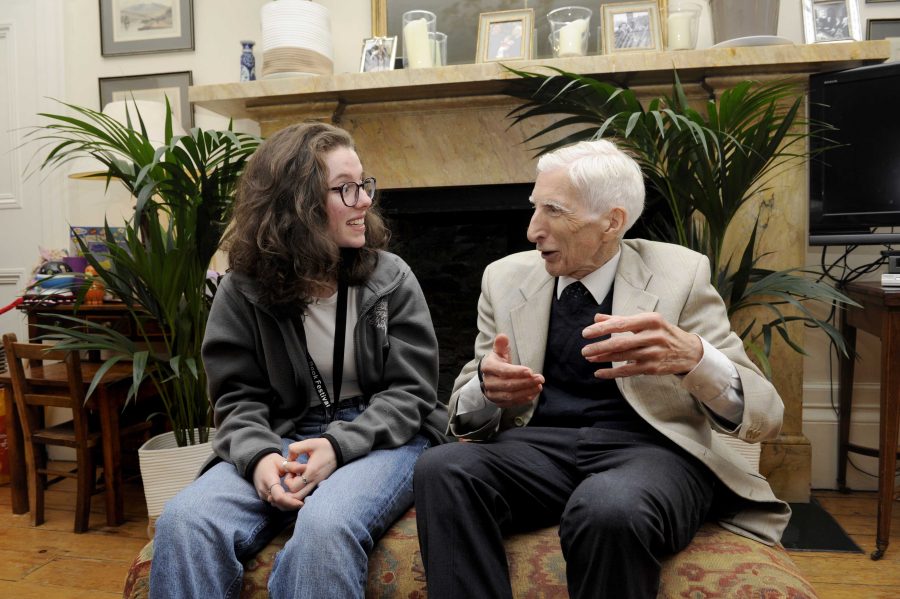The James Mirrlees Lecture
Lord Martin Rees


Described as one of Scotland’s greatest minds of the past century, Sir James Mirrlees was the son of a bank teller from the Galloway village of Minnigaff. He went on to win the 1996 Nobel Prize for economics.
This weekend saw The Galloway Preservation Society unveil a plaque at Sir James’ (1936-2018) Mill Cottage birthplace, followed by the inaugural James Mirrlees Memorial Lecture which took place as part of the Wigtown Book Festival.
Delivered by his old friend the Astronomer Royal, Professor Lord Martin Rees, the lecture looked at The World in 2050 and Beyond. It was inspired by one of Sir James’ lifelong interests, the conundrum faced by all governments, companies and even families – how much should we spend today and how much should we invest for the future.
This was a theme Prof. Rees recalls James discussing at an event when they first knew each other as students at Cambridge. It was a friendship that developed when Prof. Rees was Master of Trinity College where James was Professor of Political Economy.
A firm believer in the need to redistribute wealth at a global level, the professor said that the policies James Mirrlees encouraged the UK and Scottish governments to follow benefitted the lives of around 100 million of the world’s poorer people.
As the effects of global warming ratchet up and with the world’s population increasing fast, Prof. Rees argued that it’s a matter of both fairness and self-interest for the wealthier parts of the world to ensure that resources, opportunities and wealth are equitably shared.
Indeed he said the moment has come for the wealthy nation to instigate “a mega Marshall Plan” for the Global South – with the whole of humanity facing immense risks if this does not happen.
Looking at the threats and opportunities facing the planet, and the human species, Prof. Rees looked at issues as wide-ranging as food supply, green energy technology, space exploration, environmental degradation, biodiversity and biotechnology.
His greatest fear is that the same biotech being developed to help us fight disease can be used to manipulate viruses, including influenza and coronavirus, to make them far more virulent and destructive – raising the prospect of manmade pandemics.
And the concern is that there is never a shortage of extremists prepared to go to any lengths to achieve their aims – he said: “In the Global Village there will be plenty of village idiots, but they will have global range”.
Another pressing issue is the advance of robotics and artificial intelligence, which are increasingly able to outperform humans in a multitude of complex but routine tasks. This means that many roles, including skilled ones in traditionally well-paid professions, will be mechanised.
This process will generate efficiencies and wealth, but the question facing humanity is how the economic benefits of progress are used. Prof. Rees argued that the smart thing to do is to invest them in rewarding humans well for doing the things they are best at, such as caring and nurturing.
Care of the young, the sick and the old are necessary, rewarding and currently hugely undervalued. And, as human lives get longer and science strives to find ways of extending it further, the professor believes the need to care for one another may become even more acute.
Following the lecture there was a reception for Prof. Rees attended by Sir James’ widow, Patricia Mirrlees, Lord Lieutenant of Wigtownshire Aileen Brewis, and memorial lecture organiser Graeme Stewart.
Other guests included Ken MacKenzie Depute Head of the Douglas Ewart High School where James was Dux. The Astronomer Royal was presented with a print of the Orion Nebula by Helena Cochrane, one of the school’s current students, who is a keen astronomer with her own astrophotography YouTube channel.
Tributes to James Mirrlees
The teenage James Mirrlees had a habit of reading university level works on maths on the bus to the Douglas Ewart High School in Newton Stewart. He told teachers that his ambition was to be a professor – quite an ambition for a boy growing up in the rural Galloway of the 1940s and 50s. But his potential was recognised and his teachers did all they could to help feed his voracious appetite for knowledge.
James then went to the University of Edinburgh, followed by Cambridge and followed an academic path that saw him teach at Oxford University, where he was Edgeworth Professor of Economics, and at the University of Cambridge. He was also an advisor to the UK and Scottish governments.
His intellect was astounding – and during the festival’s memorial events Sir James was described as having one of the greatest minds from Scotland of the past 100 years. However his wife Patricia, younger brother Alistair – who flew over from Canada to unveil the plaque – and other relatives and friends all comment on his modesty, kindness and decency.
Indeed while describing him as “a truly remarkable man” with a “very great mind” she says he was much-loved by his students and put a tremendous amount of time and energy into nurturing their talents. The result of this is that his legacy extends far beyond his own work and ideas, with his influence living on through those he taught and influenced.
Patricia sent us the following information which offers some insights into Sir James and the high regard in which so many held him.
She tells us:
When Jim was about to graduate from Edinburgh University, Henry Geddie, his former headmaster wrote a letter dated 3 July 1957. Jim had won the Napier Medal and Gadgil Prize and was also to win the Ferguson Scholarship. “What a day Friday is going to be for you and for the family! Graduation with all the Honours you could possibly win, and all on your 21st birthday! There will definitely be a party! Let me wish you ‘Many happy returns.’ It is hopeless for me to try to tell you how much your superlative achievement means to us with whom you worked in your years at school. Suffice it to say - we are all very proud of you.”
When Jim received the Nobel Prize in 1996, he was both delighted and a little embarrassed at all the attention. Jim had an exceptional mind, and he was also exceptionally modest – embodying the values of small-town Scotland where you worked hard and lived without ostentation.
Only after Jim’s death, I found in an old file box marked “Nobel stuff” a pile of letters he had received when the Prize was announced.
Among the “Nobel stuff”, was a letter from Margaret Wilson, an old classmate at the Douglas Ewart High School in Newton Stewart. She wrote: “Was it really August 1947 that my mother told me on the evening of my first day at school that you would be the Dux of that year’s intake and added, ‘that boy will go far’? This bewildered me – I did not realise she was talking in terms of what you would achieve academically. I thought she meant you might go to the United States.”
John Korner, son of Emil Korner, a Czech economist and owner of the House of Elrig near where Jim’s parents lived (and where Gavin Maxwell, the naturalist and author, grew up and artist Oscar Kokoschka often stayed) recalled, “…your father arranged to bring you up here to meet my father when you were still, I think, an undergraduate (actually a postgraduate at Trinity College Cambridge). My father thought highly of you (a rare occurrence), so much so that he mentioned your visit when I next came to stay. He also, I believe, presented you with a copy of one of his books, presumably as a shield against Keynsian corruption, and may be assumed to be looking down, with gratification, on one of his early assessments.”
One of Jim’s undergraduate students at Cambridge was Peter Bottomley (now Sir Peter and an MP). When Jim received the Nobel prize, Peter wrote that he called on Jim to apologise for being “his most lazy and stupidest undergraduate.”
Later, Jim wrote to Peter saying that he was the fourth of his students so far to receive a knighthood. Peter said, “Jim added that for the first three he shared the credit, for me he could share the pleasure… He underestimated his influence. His honesty and his example have been a light to me and to many.”
Angus Deaton (Scottish Nobel Economist 2013) wrote: “There has been very little over the last few years that has given me as much unalloyed pleasure as the announcement that you had won the Nobel Prize. There is no one who deserves it more, and you honour the prize as much as it honours you.
Perhaps the most unusual letter came from Harry Keating, President of the Detection Club, formed 1930 by mystery crime writers.
Seeing in The Times recently that you are an aficionado of the sort of books members of the Detection Club write, I am emboldened to ask if you would be our guest of honour at our annual dinner at the Savoy on Wednesday November 6th…. May I congratulate you on your Nobel Prize, while marginally aware that in the book I am on the point of finishing, the victim is a Nobel winner, though from long ago and not for economics.”
The book referred to is The Soft Detective, by H.R.F. Keating published in 1997, where Detective Chief Inspector Phil Benholme discovers that the death of Professor Unwala in his cluttered London study was no accident - the Nobel Prize winner was in fact murdered.
For more about James Mirrlees see the autobiography on the Nobel Prize website.